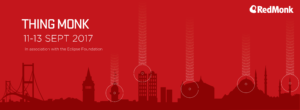Among the most interesting aspects of running an Internet of Things conference which is aimed specifically at developers, such as ThingMonk, is the opportunity to gain a real insight into what developers are currently thinking about in the space. Generally, as we review our call for papers, two or three themes emerge as being particularly important, but this year one theme has woven everything else together – Digital Twin.
Digital Twin has been defined by GE as “digital replica of physical assets, processes and systems that can be used for various purposes”. As a concept, the ideas behind Digital Twin has been around for decades, with the energy industry being particularly focused in the area. However, the historical approaches have always had limitations, from telemetry data to what was possible to measure in real time versus a simulation and so forth.
Over the last number of years, people have become accustomed to a far more instrumented physical world. Sensors are ubiquitous, the basic concepts underpinning the Internet of Things are understood, socialised and well accepted.
At the same time an inflection point has arrived, where a confluence of technologies and events have come together to make Digital Twin truly possible. Technologies such as sensors, edge processing, streaming data, cloud computing, open source software, business focused platforms, GPUs, machine learning and artificial intelligence can all justify a conference on their own, but it is when you bring them together in one place you truly begin to see what is possible.
And those possibilities are huge, but as my colleague James Governor highlighted when he asked the Eclipse Foundation to talk about Ditto, their Digital Twin project.
“In the Internet of Things two disciplines of software development come together. On one hand, a hardware influenced view of software for devices and protocols and on the other hand the view of web/mobile/business application development.
To bring these both sides closer together the metaphor of Digital Twins can be used, where a Digital Twin is kind of holistic view of all capabilities and aspects of a device/product asset including its digital representation.
It is important to make these Digital Twins accessible in a convenient way, independent of the protocols used to integrated them and the current connectivity state of the devices. The core of this Digital Twin is the information of the state of the device regarding properties and meta data.”
At the core of this move to Digital Twin are the technologists making it happen. At this year’s ThingMonk we will hear from people touching every strand of what makes Digital Twin a reality. From Open Source foundations and projects such as The Eclipse Foundation, The Things Network and Cloud Foundry, to speakers working on IoT and Digital Twin every day to at large companies such as Confluent, IBM, Microsoft, AWS, Salesforce, to cutting edge startups such as OpenSensors.
ThingMonk is on September 11th to 13th this year in Shoreditch, London. Tickets are still on sale.
Disclaimers: IBM, AWS, GE, Confluent, Salesforce and Microsoft are all current RedMonk clients.

No Comments